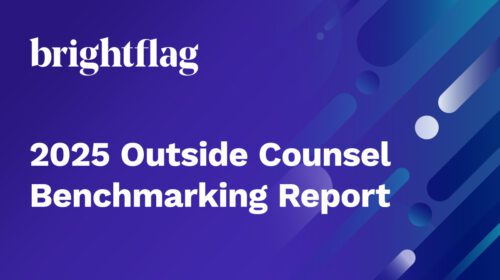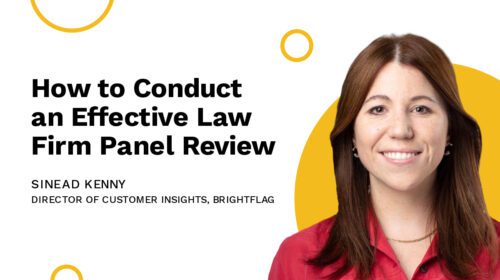Better Together: Keys to Improving Outside Counsel Relationships
For a group of professionals who so frequently encourage their colleagues to “get it in writing,” in-house lawyers have a surprising habit of leaving some key elements of their outside counsel relationships open to interpretation—which can throw a wrench into things down the road when it comes to improving outside counsel relationships.
Maybe it’s a case of assuming the law firm already implicitly understands what’s required. Or maybe it just doesn’t feel like there’s time to document and discuss every nuance upfront.
Whatever the cause, certain elements are simply too risky to leave undetermined if you want to develop a healthy and productive partnership.
At a minimum, you’ll need airtight answers to the following five questions.
1) What Does the Business Want from its Legal Department?
The most universal expectation of outside counsel is that they “know the business” of their clients. Otherwise, how can you trust them to offer relevant and effective advice?
Product offerings, revenue streams, organizational structures, industry regulations — such context is necessary but not sufficient. What law firms need to be a valuable partner can’t be found on a website or in an earnings report. They need to know what pressures and priorities the business is directing toward the legal department.
What do executives see as leading opportunities and threats? How can in-house lawyers help defend against the latter and advance the former? Which specific legal services will likely be required to achieve strategic success?
Clarifying your answers at the start of an outside counsel relationship instills the correct first principle for all future activities: Deliver relevant business value.
2) What Does the Legal Department Want from its Outside Counsel?
Engaging outside counsel is one of several viable ways to resource legal work. So when a corporate legal department elects to forego its other options, it’s worth confirming why.
Did the in-house team have sufficient capacity? Did the in-house team have sufficient domain expertise? Could the work have been automated, delayed, or otherwise avoided?
These prompts will naturally lead to a discussion on the department’s current talents, limitations, priorities, and objectives. And, given that context, outside counsel gets a clearer understanding of the exact role(s) you’re asking them to play.
At a more tactical level, you should also define what success means for each matter. Outside counsel needs to unequivocally know what “winning” looks like from your perspective and what qualifies as an acceptable outcome.
By investing even a few hours on these early relationship checkpoints, you will save months of effort and millions of dollars spent rowing in the wrong direction.
3) What are the Budget Constraints?
Financial surprises have the potential to sour outside counsel relationships faster than any other factor. It’s one big reason we believe in solidifying your legal spend management strategy early. And it’s important enough for me to recommend two separate sweeteners in this article.
The first is the top-down tactic of budget setting — and it’s not one you should feel nervous about introducing. Outside counsel knows the conversation is coming and understands your obligation to be a custodian of company money. It’s also easier for them to shape their strategic recommendations and project plans when given clear financial parameters.
For most in-house legal teams, the hesitancy comes from not feeling confident in their initial budget proposals. And while investing in modern analytics tools can nullify this concern over the long term, it’s important to remember that absolute accuracy is not the initial goal.
Regardless of the current depth or quality of your legal spend data, what you’re ultimately hoping to achieve is a proactive awareness of cost considerations and a verbal consensus on budget feasibility.
Even if the legal strategy necessitates a higher number in the end, the odds of damaging your relationship in the process will still be significantly lower as a result of your early dialogue.
4) What are the Billing Guidelines?
The second sweetener to unpleasant legal spend surprises is a more consistent and transparent invoicing process. And that all begins with a clear and exhaustive overview of acceptable billing guidelines.
As stern as that might sound, it’s important to remember that legal billing guidelines aren’t designed to be punitive. When constructed correctly, they actually protect outside counsel against subjective, biased, or seemingly arbitrary invoice rejections and adjustments—which goes a long way towards improving outside counsel relationships.
To meet the standard, you must go into granular detail on topics like:
- Invoice file formatting
- Invoice submission deadlines
- Invoice submission process
- Narrative detail requirements
- Non-billable service categories
- Staffing preferences & limitations
It’s also important not to confuse documented with done. New firms and new matters will inevitably stretch your thinking in new and necessary directions over time. So although legal billing guidelines won’t be revised as frequently as budget forecasts, you should at least plan for an annual review.
5) How is Outside Counsel Performance Evaluated?
Just as they have a right to know which invoice items are likely to be approved, law firms also have a right to know which habits are likely to be rewarded. Both concerns are best addressed by a focus on objectivity.
Assuming you didn’t skip over the organizational and departmental factors referenced in the first two sections of the article, this final element will be straightforward to control. Start with a specific business result and work backward to define a few early indicators of progress.
If executives have tasked your department with reducing annual spend by 15% year-over-year, for instance, then some metrics worth monitoring might include:
- Billing guideline compliance
- Actual vs. budgeted spend
- Blended hourly rate
Your perception of outside counsel performance will surely be shaped by qualitative factors as well, such as subject matter expertise, communication style, and responsiveness. Even these ratings can and should be recorded in a systematic fashion (e.g. Law firm scorecards).
Whichever criteria you believe are best, making your expectations explicit and their measurements transparent will put both sides of the partnership in a better position to realize the outcomes they want.
A Trusted Template for Improving Outside Counsel Relationships
Finding time to discuss and document your outside counsel expectations is never easy, but if you’re focused on improving outside counsel relationships, there’s no need to start from a blank page.
Brightflag’s 2023 Sample Outside Counsel Guidelines reflect our experience working with hundreds of legal departments and offer everything you need to craft your perfect set. Click here to download now and get started today!



